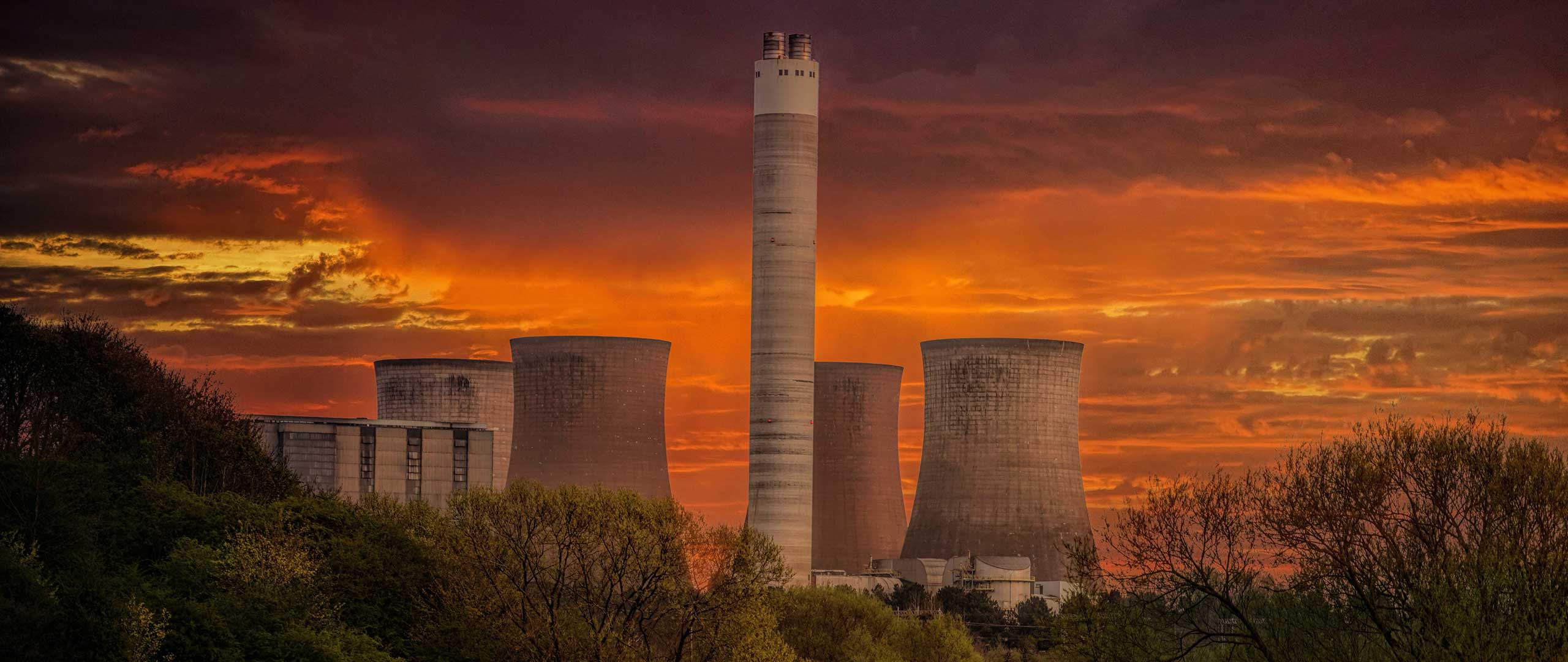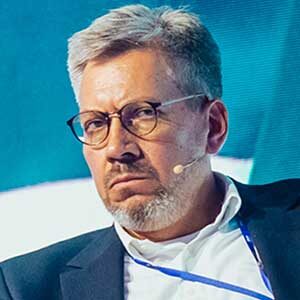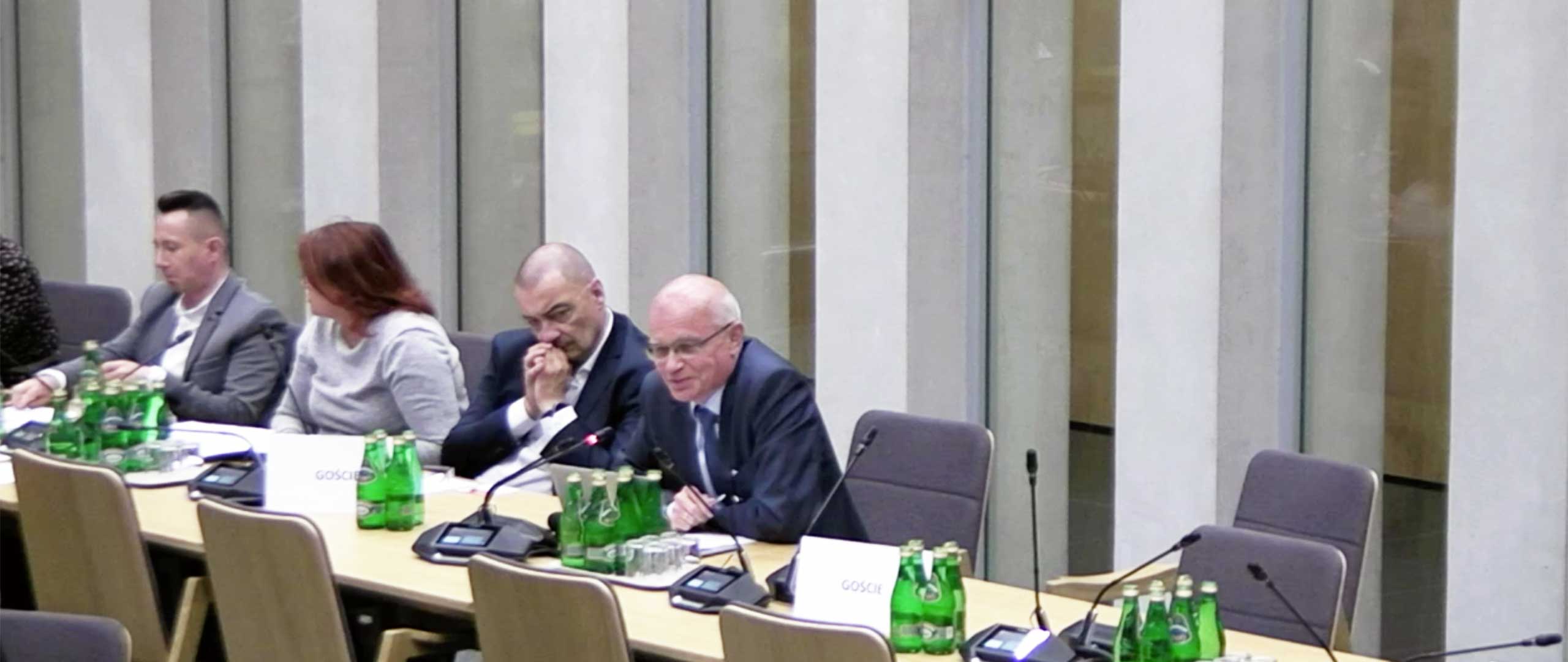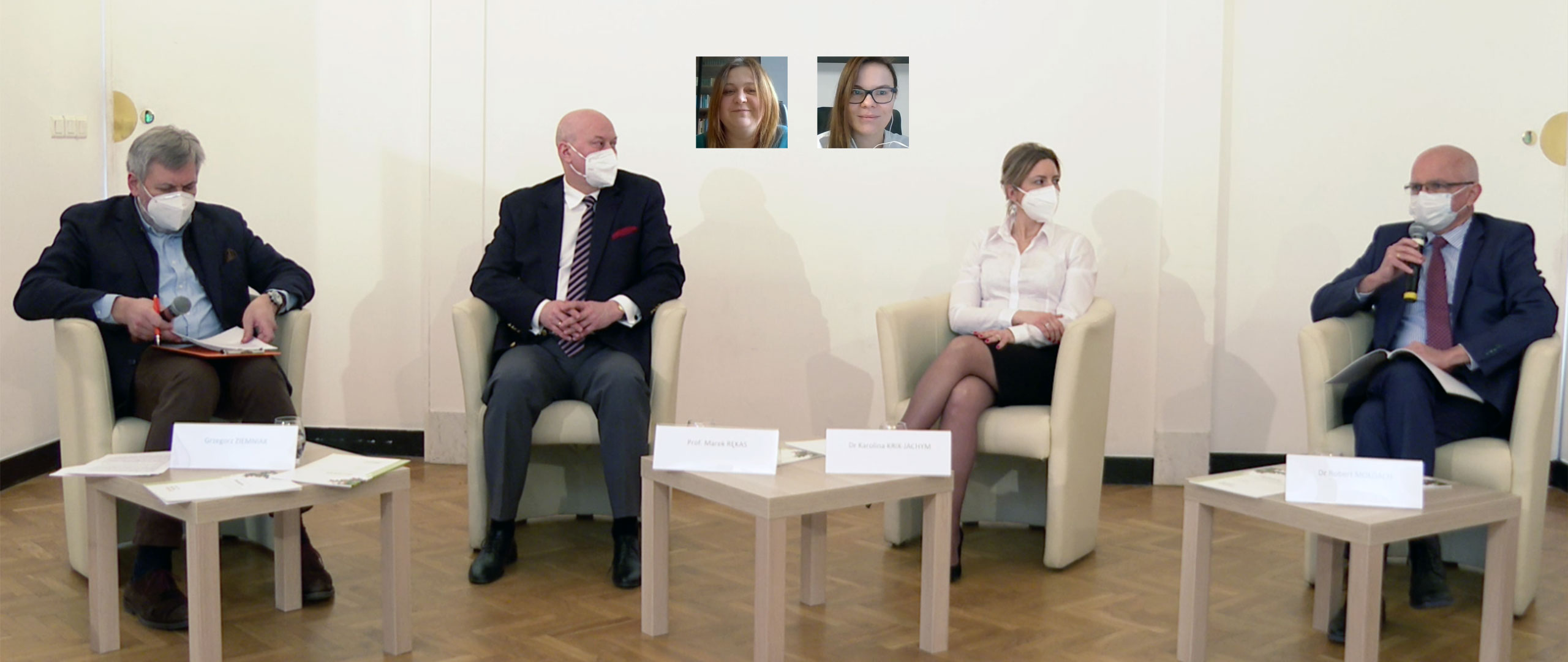Analizy, Dialog społeczny, PDF, Raporty, Reformy, Zdrowie publiczne
The reality check – clean air in political programs 2023
Despite years of concerted efforts by stakeholders and public policy centers advocating for a greater emphasis on clean air, we have yet to secure the commitment of key government officials and the broader political landscape in Poland. While some solutions addressing specific clean air issues have been implemented, they lack coherence and do not represent a comprehensive public policy. This slow advancement in clean air policy is a challenge we all face. Last year, we prepared a report evaluating the feasibility of clean air public policy in Poland and exploring ways to enhance it. Now, we are examining how political parties incorporate this issue into their manifestos for the 2023 parliamentary election.
First, we sought the opinions of members from the Standing Subcommittee on Air Quality and the Committee on Environment, Natural Resources, and Forestry of the Polish Parliament regarding the maturity of clean air public policy in Poland. To ensure data comparability, we employed the same Andrews’ framework that we used in the aforementioned report. Responses were given on an uncertainty scale, where „0” represents complete certainty and „6” signifies a lack of awareness, blind spots, and chaos. The results of this assessment are presented in the image below.
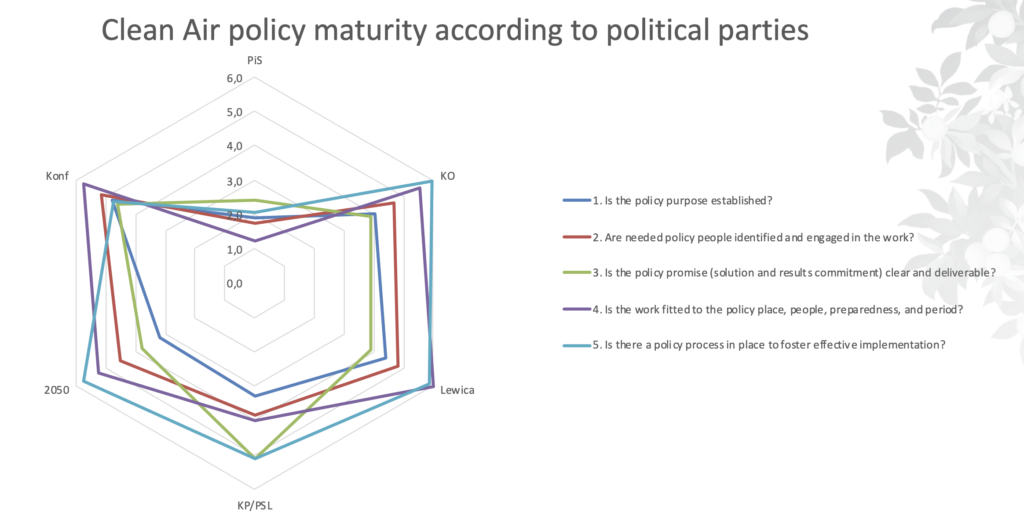
The results are as expected: self-assurance from the ruling party and criticism from the democratic opposition. However, there are couple of noteworthy observations. Despite their general optimism, the Law and Justice party acknowledges substantial risks concerning the future success of their policy in the realm of their promises. According to them, the policy solutions and anticipated outcomes are not entirely lucid or achievable. This implies that while the chances of policy success remain uncertain, there’s a belief that the issues it poses can be resolved. Below, we highlight the policy areas of greatest concern for the ruling party, along with the average response provided in their self-assessment:
- Are the potential winners and losers of this policy work clearly identified, accepted and being managed? (av. answer: 3.82)
- Are public beneficiaries and other affected public parties actively engaged with (and committed to) the work? (av. answer: 4.23)
- Are risks of non-delivery of milestones and deliverables clear and manageable? (av. answer: 3.75)
- Are agents being (or likely to be) effectively mobilized to execute programmed actions? (av. answer: 3.2)
It’s important to note that any response above 3 in the policy maturity evaluation process is a red flag. It indicates a level of uncertainty that borders on ambiguity.
So critical opinions from the opposition on the clean air policy future success should be reflected in their political programs. We have review them with that respect and find it not really the case. Below are presented each party postulates presented in their election manifestos regarding clean air.
The Left (KW Nowa Lewica)
This program is among the most acknowledging of the challenges facing clean air policy. Specifically, like the Law and Justice party, it believes that Poland should ensure energy security while also addressing climate change seriously. It also highlights the smog issue. However, it doesn’t specify how to strike this balance.
29. Poland’s energy resilience. We must be a country that is both energy secure and serious about climate change. Instead of depending on raw materials from Russia and other dictatorships, we will bet on the development of energy based on renewable sources and nuclear energy. Moving away from fossil fuels is a civilizational necessity. We will support Polish and European research in clean energy, energy efficiency and energy storage.
30. Green light for renewable energy. Thanks to public investment in solar panels and onshore and offshore wind power plants, most of the electricity consumed in the economy will come from RES in 2035. We will unlock the development of RES, among other things, by easing harmful distance regulations, and we will develop energy storage capacity, including through pumped storage power hydro plants. We will develop biogas plants and biomethane plants in rural areas. In the next few years, with the addition of nuclear, we will lead to a zero-carbon energy mix. Stable energy generation with its contribution will also enable the production of green hydrogen for transportation and the chemical industry.
31. Energy-efficient infrastructure. The cheapest and cleanest energy is that which does not need to be produced. We will implement systemic solutions leading to energy savings. The public sector will set a good example by implementing thermo-modernization of public buildings (educational institutions, health care, administration, etc.) and implementing a program to modernize the street lighting system using smart technologies.
32. Electrification Program. We will carry out a thorough modernization of Poland’s transmission and distribution network to reduce energy losses in transmission, lower electricity bills and reduce the number of failures. The investments will also allow the grid’s capabilities to be adapted to the new geographic distribution of generating capacity and a larger number of non-controlled distributed sources.
35. Energy shared ownership. We will introduce legal facilitation for the creation and development of energy cooperatives and community energy clusters, co-managed by residents, including priority in applying for funding. Everyone will be able to benefit from clean energy by becoming a shareholder – and thus an energy producer – in an energy cooperative, including in cities. We will involve citizens and citizens in the decision-making and investment process in public investments in RES, so that no one is left behind.
36. European Energy Union. We support the strengthening of energy cooperation within the European Union. We will bet on EU cooperation in sourcing raw materials in order to lower their prices and prevent suppliers from playing community countries against each other. The European Union needs an effective system to promote and finance a fair energy and economic transition. We will work to replace the current EU Emissions Trading System (ETS) with a more predictable and less speculation-prone fee system. Until then, we will ensure that every zloty from the ETS is allocated to reducing Poland’s carbon and environmental footprint.
46. Fight against smog. We will fight the smog problem by developing district heating and system heat and expanding the boiler replacement program. We will cover up to 100% of the cost of replacing boilers for low-income households. We will introduce an obligation to issue universal air pollution alerts when the standards applied in the European Union countries are exceeded. We will carry out an investment program to insulate homes and save energy for a target of 1.5 million buildings, co-financed by the European Union.
70. Electrification of transportation. We will develop electromobility in Poland. In addition to electric trains and streetcars, we will invest in electric buses and trolleybuses. We will increase the number of charging stations for electric cars to enable convenient travel. We will invest in research and implementation of hydrogen and biofuel technologies where electrification would be ineffective.
The Civic Coalition (Koalicja Obywatelska)
The manifesto doesn’t even mention „clean air” explicitly. While there are some proposed initiatives that support this goal, the crucial document outlining how to facilitate an energy transition to reduce CO2 emissions is merely announced, not detailed.
56. We will create a program for the restoration of peatlands and wetlands that will take full account of the interests of Polish farmers to protect the environment. It is estimated that man-drained peatlands emit more greenhouse gases in Poland than the power plant in Belchatow.
62. We will reduce the cost of running farms: providing support for investment in biogas plants, photovoltaic farms and heat pumps.
84. We will restore favourable billing rules for energy produced for prosumers – lower electricity bills for those investing in photovoltaics.
85. We will enable the creation of 700 local energy communities generating their own cheaper electricity.
86. We will submit a bill to unblock the possibility of onshore wind power development (reducing the distance to 500 m) with clear and fast rules for issuing construction and connection decisions. Local communities will receive 5% of revenues from energy sales.
89. We will present a detailed energy transition plan to reduce CO2 emissions by 75% by 2030. We will accelerate the development of low-carbon energy sources (RES and nuclear power). We will develop assumptions for a coherent nuclear power development program and precisely define how it will be financed.
The Thord Road (Trzecia Droga)
Although „clean air” is highlighted in the title of one of the 12 guarantees of the Third Road, its treatment is superficial. Only a few solutions are mentioned, primarily as examples, and they are neither elaborated upon nor comprehensive in terms of the country’s energy transformation. As a result, the topic is merely touched upon.
8. Green Poland. Cheap electricity, clean air.
Homeowners, farmers, and entrepreneurs will be able to produce cheap green energy and profit from it. Thanks to the funds from the National Recovery Plan, we will power Poland with energy from our sun, wind, and our biogas plants. We will allow the purchase of electricity from panels directly from private farm owners. It will become as simple as online shopping and, above all, cheaper than today due to competition between suppliers. We will break the state monopoly on power networks.
We must protect the natural environment, and Polish forests are our national treasure. Unfortunately, the amount of wood exported from Poland is growing rapidly, and almost 19 million cubic meters of wood have been exported from the country in just 4 years. We will limit the export of unprocessed raw materials outside the EU. Timber from Polish forests should primarily serve Polish business. We will stop treating Polish forests as mere wood factories. We will eliminate senseless clear-cutting, and the most valuable 20% of Polish forests will be under a complete logging ban. We will also strive to increase the area of national parks and nature reserves to better protect the unique species of flora and fauna in Poland.
The Confederation (Konfederacja)
As a fundamental tenet, the party opposes what it terms as the over-regulation of life. While it staunchly supports the freedom of choice, this doesn’t mean it overlooks the need for an energy sector transformation. Beyond embracing coal to maintain our energy sovereignty, it backs nuclear, gas, geothermal, biomass, biogas, and hydroelectricity. However, it opposes state aid for photovoltaic systems and wind turbines, rejecting a strategy based on continuous subsidies and regulations, preferring instead to leave such decisions to the market. Underlying their stance is the principle that Poland must not become reliant on energy imports, whether in the form of fuels or technology and components for wind and solar power plants.
Opposition to the methane agreement, which would mean: closing about 90% of Poland’s mines by 2027 and eliminating thousands of jobs, deepening Poland’s energy dependence, increasing energy costs for businesses and households.
Opposition to the ETS system of certificates for CO2 emissions in industry and energy, which would mean: more than doubled electricity bills due to CO2 emission fees and bring about the collapse of Poland’s coal mining and power sector.
Opposition to the ETS2 system of certificates for CO2 emission certificate scheme for transport and construction, which would mean: raising fuel prices – and thus the prices of most goods and overall inflation, and raising the price of housing and homes.
Opposition to the ban on registration of new combustion cars, which would mean: a radical increase in the price of cars and a decline in their usefulness, depriving a large part of the population of the opportunity to own their own means of transportation, and elimination of thousands of jobs related to the traditional automotive industry.
Opposition to the Mobility Package, which would mean: increase the cost of transport throughout the Union, and thus fuel inflation, and blocking the development of the Polish transport industry, which is one of the key sectors of our economy.
Opposition to the EPBD Building Directive, which would mean: forced „climate renovations” at the expense of the owner in order to meet the exorbitant standards, astronomical costs for society as a whole due to the need to renovate millions of buildings that do not meet „climate” criteria, and raising housing and home prices.
Opposition to CBAM regulation, total ban on the use of fluorinated gases and other Fit for 55 solutions.
(…)
Poland without coal is a dangerous utopia (…) making Poland dependent on energy imports in the form of fuels and technology and components for wind and solar power plants. Therefore we propose:
Coal: Maintaining coal as a major part of Poland’s energy mix. Increasing coal mining. Modern use of coal (coal gasification, hydrogen production and CCS). Discounts in climate commitments on the pace of carbon dioxide reduction by Poland.
Atom: Technology transfer and training of personnel to achieve independence in nuclear power production. Technological development toward independent nuclear fuel production.
Gas: Investment in exploration of new gas fields. Increasing domestic extraction. Development of new extraction technologies. Limiting the presence of gas in the Polish energy mix to as much as can be extracted domestically and safely imported.
Geothermy. Local governments and companies will be able to implement geothermal projects faster, and Poles will be able to enjoy cheap clean electricity in just a few years.
Biomass and biogas. To unleash the production of energy for own use. Farmers to be allowed to use biofuels made from their own raw materials for their agricultural machinery. This primarily involves the production of biodiesel from rapeseed.
Photovoltaic and wind turbines. Rejecting the strategy of continuous subsidies and regulations. The market will decide.
Hydroelectricity: To build small water stages, pumped storage power plants and dams on rivers. Enabling inland navigation.
The Law and Justice (Prawo i Sprawiedliwość)
The party seeks to bolster the country’s energy sovereignty by diversifying its energy sources, encompassing coal, gas, biomass, renewable energies, and potentially nuclear in the future. Uniquely among the parties considered, it emphasizes clean air as a priority. However, it posits that until there are significant investments in renewable energy sources (RES) and nuclear energy, coal remains essential to Polish energy security. These investments should also focus on the growth of Polish technology. This narrative resonates with many themes often associated with the Confederation.
The fight for clean air is a priority of the Law and Justice government. In 2018, we launched the Clean Air program with a budget of PLN 130 billion until 2029, enabling comprehensive thermo-modernization of homes and replacement of heat sources with low-emission ones.
We led to the signing of a social agreement on the transformation of the charcoal mining sector in 2021 (among others „clean coal” installations and the termination of charcoal mining to the end of 2049).
In 2018, we adopted a law on promoting electricity from high-efficiency cogeneration, which is an important support for the supply of heat and electricity and the fight for clean air.
We have introduced into the legal order the institutions of the collective and virtual prosumer. Soon the prosumer directory will expand to include another category – the tenant prosumer, which will cover multi-apartment buildings.
The Program for the Construction of 100 City Rings for 2020-2030 with a budget of PLN 28 billion. As part of its implementation, road bypasses of towns along national roads are being built, taking transit traffic out of built-up areas.
(…)
Aiming to increase the country’s energy sovereignty, we have focused on infrastructure development, diversification of energy sources and introduction of new regulatory and system solutions. The energy policy of the Law and Justice party is stable and secure energy supply through full diversification (coal, gas, biomass, renewable energy sources, and in the future – nuclear). During the eight years of the rule of Law and Justice, we have led to the full derusification of the Polish energy sector. We are betting on energy independence through optimal use of Polish raw materials and dynamic development of low-cost renewable energy sources, including distributed energy.
We will offer Poles an Energy Pact, which will ensure Poland’s energy security for the coming decades. The pact will be based on three basic pillars: nuclear, renewable energy sources and reserves in the form of mining.
Until investments in RES and nuclear energy are made, coal is and will remain a guarantee of Polish energy security.
Investments will include expansion and modernization of medium- and low-voltage networks in order to enable the development of electrification, electromobility, connection of new sources, increase in resistance to adverse weather conditions, management of distribution network operation stability under conditions of high RES share, construction of electric vehicle charging infrastructure, digitalization and automation of distribution network operation, installation of remote reading meters, increase in use of cable technologies.
We are seeing increased interest in the use of heat pumps in individual households – already every third investment involves a heat pump as a heat source. Therefore, we have accelerated research and development work and will launch a factory of Polish heat pumps.
Given the nebulous treatment of clean air topics in party manifestos, we recommend the following strategies to strengthen clean air policy maturity:
- Foster Interdisciplinary Collaboration: The government should form a specialized task group composed of representatives from diverse ministries, government agencies, and stakeholders from both the public and private sectors, including NGOs. This group’s primary purpose would be to coordinate and collaborate on clean air policy matters.
- Identify Policy Stakeholders: It’s essential to pinpoint both the beneficiaries of policies and those who bear the costs to mitigate conflicts of interest. Beneficiaries should be categorized by social demographics, technological sectors, and clean air regions. Conversely, those bearing costs, or „obligatees”, should be recognized within fossil fuel industries, high-emission regions, and among consumers of traditional energy sources, including marginalized groups.
- Maintain Energy Resilience and Sovereignty: Poland should guard against becoming overly reliant on energy imports, whether these are fuels or components for renewable energy source (RES) plants. By promoting research and development in clean technologies, Poland can foster innovation, create indigenous expertise, ensure technological security, and lay the foundation for a sustainable economy.
- Leverage Data in Policy Work: The government should critically assess the air quality measurement system, ensuring coverage, sensor functionality and data accuracy. Special attention should be directed towards socially significant areas like residential zones, parks, schools, and hospitals. Incorporating health and economic data will provide a more comprehensive view of policy impacts, necessitating the creation of a robust evaluation matrix.
- Educate and Support the Public: Raising awareness about air pollution, its origins, and health repercussions should be paramount. The government should actively engage schools, healthcare providers, social media, and platforms for social dialogue. Moreover, gathering public feedback can inform and refine policy-supporting initiatives.
These strategies ought to be prioritized by the incoming government upon its establishment.
